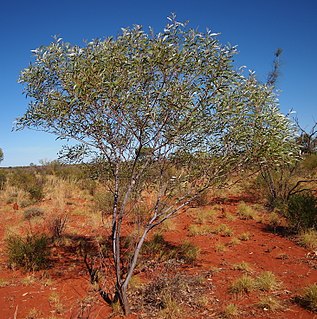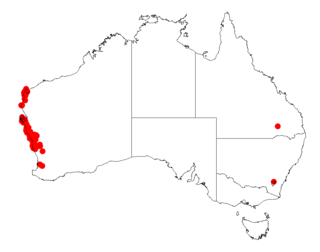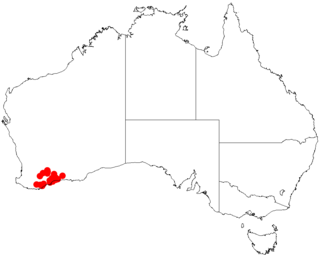
Acacia pterocaulon is a shrub belonging to the genus Acacia and subgenus Alatae. It is native to a small area in the Mid West region of Western Australia.
Acacia diallaga is a shrub belonging to the genus Acacia and the subgenus Juliflorae that is endemic to Western Australia.
Acacia gibsonii, commonly known as Gibson's wattle, is a shrub belonging to the genus Acacia and the subgenus Juliflorae.

Acacia mulganeura, commonly known as milky mulga and hilltop mulga, is a tree or shrub belonging to the genus Acacia and the subgenus Juliflorae that is endemic to arid parts of central and western Australia.

Acacia repanda is a shrub belonging to the genus Acacia and the subgenus Juliflorae that is endemic to a small area in western Australia.

Acacia rhodophloia, commonly known as minni ritchi or western red mulga, is a tree or shrub belonging to the genus Acacia and the subgenus Juliflorae that is endemic to a large area of arid central western Australia. The Indigenous group the Kurrama peoples know the plant as mantaru.

Acacia richardsii is a shrub belonging to the genus Acacia and the subgenus Juliflorae that is endemic to north western Australia.
Acacia sulcaticaulis, also commonly known as the Mount Mulgine fluted wattle, is a shrub or tree belonging to the genus Acacia and the subgenus Juliflorae that is native to a small area in western Australia.

Acacia thomsonii, commonly known as Thomson's wattle, is a shrub or tree belonging to the genus Acacia and the subgenus Juliflorae that native to parts of northern Australia.

Acacia pachyphylla is a shrub belonging to the genus Acacia and the subgenus Phyllodineae that is endemic to south western Australia.

Acacia pachypoda is a shrub belonging to the genus Acacia and the subgenus Phyllodineae that is endemic to south western Australia.

Acacia spathulifolia commonly known as Gold carpet or the Gold carpet wattle is a shrub of the genus Acacia and the subgenus Phyllodineae that is endemic to coastal parts of western Australia.
Acacia anserina, also known as hairy sandstone wattle, is a shrub of the genus Acacia and the subgenus Plurinerves. It is native to a small area in the Kimberley region of Western Australia.
Acacia graciliformis, also known as Koolanooka Delicate wattle, is a shrub of the genus Acacia and the subgenus Plurinerves that is endemic to a small area in western Australia.

Acacia pharangites, commonly known as Wongan gully wattle, is a shrub of the genus Acacia and the subgenus Plurinerves that is endemic to the Wongan Hills of south western Australia and is listed as endangered according to the Environment Protection and Biodiversity Conservation Act 1999.

Acacia recurvata, commonly known as the recurved wattle, is a shrub of the genus Acacia and the subgenus Plurinerves that is endemic to a small area of western Australia.

Acacia tetanophylla is a shrub of the genus Acacia and the subgenus Plurinerves that is endemic to an area of south western Australia.

Acacia vittata, commonly known as Lake Logue wattle, is a shrub of the genus Acacia and the subgenus Plurinerves that is endemic to a small area in western Australia.

Acacia cretacea, also known as chalky wattle, is a shrub belonging to the genus Acacia and the subgenus Phyllodineae that is endemic to South Australia.

Acacia microcarpa, commonly known as manna wattle, is a shrub belonging to the genus Acacia and the subgenus Phyllodineae endemic to south eastern Australia.















